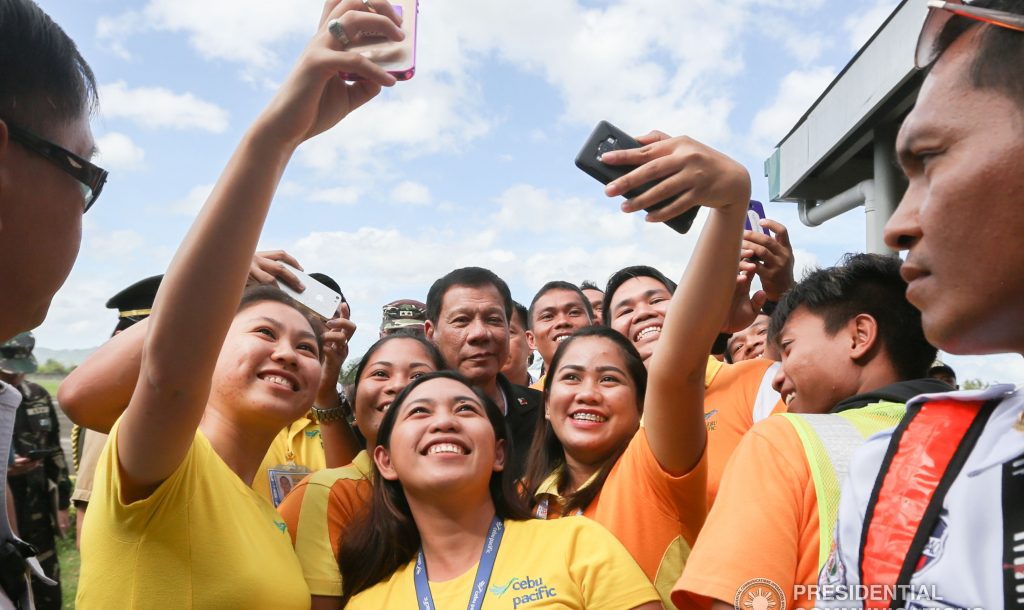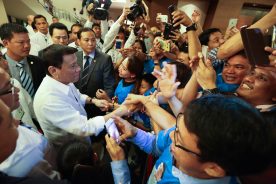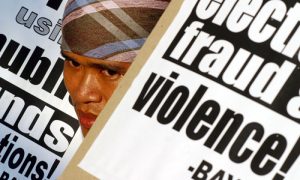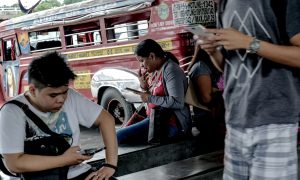Growing up in Mindanao, I was socialised to detach everyday life from national politics. My aunties and grandparents rarely paid attention to primetime news. Why should they? For a long time, national affairs had always been a thing in the North. Our family lived far enough from Mindanao’s conflict areas for us to feel secure, though we have lived close enough to feel the hassle of passing through military checkpoints after an occasional bomb blast.
Then comes Rodrigo Duterte.
“If I become President, it will be bloody,” he said on national television. Suddenly, my relatives were glued on television, cheering for a man they consider to be the son of the South.
I felt conflicted. I was alarmed by his language but also felt connected to this man. Duterte was not just a tough guy running for President. He was the surrogate father of my father, the mayor from Davao City whose heart knows what’s best for Mindanao. My instinct, however, told me that nothing good can come out of using threats as campaign slogans.
That I continued to make a great deal against his brutish remarks was ridiculous for my friends. They made fun of me, called me names like “fake woke”, “too smart”, “too emotional”, and the proverbial “Dilawan” (supporter of the Aquinos) whenever I criticised the regime’s drug war, misogyny, closeness to the Marcoses, and political persecution.
My defensiveness, I surmise, came from a deeper psychological state, a sense of regret, that I failed to cast a ballot in 2016. It should have been my first time to vote.
The youth votes
Two figures will shape the 2019 midterm race. Around 2.1 million Filipinos are voting for the first time and among the 61.8 million registered voters, a third of them belong to the young population.
Zeroing in on Mindanao, polling data finds that 62% of 18-24 year olds are “satisfied” with the President’s performance in the last quarter of 2018. This is a leap from the 49% rating in the previous quarter. Though one may interpret this as youth support for Duterte, it is also fair to say that younger people tend to like him less. The 62% satisfaction rating among young people is significantly less than the average of 73% of the Mindanaoans satisfied with the Duterte administration.
How the Mindanao youth votes matters in reflecting the region’s political future.
Four conversations
As part of my research job, I had to interview young Mindanao voters to learn about their views on politics. In many ways, their views reflect the perplexed situation of the island. Some were reticent while others were proudly progressive. Others continue to remain on the fence, while others actively campaign for a few candidates. Still, some see hope in President Duterte, but most of the young people I talked to see him unfavourably, for different reasons.
Here are their stories.
I. The self-assured voter but distant communicator
I spoke to Maye from Cebu City where she is studying medical technology. She is 19 years old and voting for the first time.
I assured her I was not holding a clipboard of dull survey questions, and our discussion would be free-flowing so I could get to know her views better.
Maye came across as a self-assured voter. She was clear in saying that the Duterte administration should prioritise healthcare, for this is a “great equaliser”. She embraced a feminist agenda by making a case for the legalisation of divorce. She talked about the values she likes in candidates running for office. She will not vote for candidates who have cases on graft and corruption. She supports candidates who are clear on their stand on human rights and good governance. Educational background and legislative track record are also important. Candidates whose campaign is built on photos of them handing out relief goods to the poor mean nothing to her.
What a tall order, I thought to myself. And so I pressed her to answer whether there were candidates running for the Senate that met her standards.
Maye has two names, at least for now: human rights lawyer, Chel Diokno and Maranao peace advocate, Samira Gutoc. Both are running in the opposition slate Otso Diretso. She is impressed with Gutoc’s performance in debates, while she finds Diokno’s work deserving of a bigger platform in the senate.
I know that Maye is not a representation of how all young people will vote. As Davao-based political scientist Christian Lloyd Espinosa reminded me, the youth vote is not a decisive bloc. Young people espouse different perspectives and their political power is fragmented. One can only hope that more thought goes into the young people’s vote this time around.
With this in mind, I asked Maye whether she would help her friends make decisions about their vote. She hesitated, and said she could only do so much.
Like me, Maye is expressive about her views on Twitter, but that’s because she prefers conversing from a distance than debating personally. President Duterte is still popular in Maye’s hometown in General Santos City. Even in Cebu where she is studying, she finds that many of her peers cannot tolerate critical views. Out of fear of severing relationships, Maye chooses not to burn bridges by talking politics in person. At best, Maye vows to maximise the virtual public sphere by exposing truths, blocking disinformation, and engaging in short discussions.
II. The Duterte supporter
I called a stranger, an accountancy student from a university in Davao City. Airon preferred a faceless conversation over a video call. But his inflections were enough for me to notice his political convictions. Like Maye, he will cast his first vote in Libungan, a town in Cotabato Province. He said his vote represents his views on economic development, labour rights, and education reforms.
Airon was open in declaring his support for President Duterte. This, however, does not mean he has no reservations about some of the President’s decisions. He is critical of the lowering of the minimum age of criminal responsibility from 15 to nine years old.
Why so serious: the limits of liberal democracy in the Philippines
Populism has left liberal democracy on the defensive. Liberals might think to adopt elements of Duterte's populist idiom.
Airon went on to say he favours policies that the administration apparently pursues, including divorce, the death penalty, the war on drugs, salary increase, and end of contractualisation.
When I asked him the qualities of an ideal senator, he started with what doesn’t matter to him: educational attainment. There are a lot of politicians with impressive resumes who use their skills to steal, he said. A candidate should be a public servant, he added, who is willing to serve and spark hope to Filipinos. Collaboration is also essential for a senator who, despite differences in political lines, should still cooperate for a larger cause.
Airon still is making up his mind who to vote for the election, but according to him, re-electionists Senators like real estate mogul Cynthia Villar, and children for political heavyweights Sonny Angara, and Nancy Binay have the upper hand. He will vote for them because of their expertise in economic development.
He paused, then assured me that he intends to reserve ballot slots for Mindanao: Samira Gutoc from Marawi City is on his list. He had seen her debate and was impressed by her performance.
He also expressed support for Ronald (Bato) dela Rosa, the former Chief of the Philippine National Police and Bong Go, Duterte’s personal aide. Neither of them have experience writing laws, but Airon thinks they have something new to offer.
“Offer what?”, I asked. “Perhaps national security and crime reduction for Bato, and investments for Bong Go”, he replied. I wasn’t certain what he meant.
What was clear was that Airon believes that Senators must be in line with the Duterte administration’s decisiveness. This is one of the most important characteristics of this government, unlike the Aquino administration’s liberal reformism that did little to uplift the nation. Airon mentioned to me that he belongs to a church that prayed for Duterte’s victory. I could not help but think that if they were able to pray for a butcher’s victory, surely they could pray for a more humane society.
It was easy to spot the differences in our views. Navigating the conversation was difficult for me, though I am glad that we managed to engage in a productive way.
III. The woke eighteen-year-olds
It was lunchtime when I met Alden and six of his classmates. They were grade 12 students in a Catholic university in Koronadal City.
In the group, two of them had facilitated causes for youth empowerment. One is a debater. Another one devotes her time serving the church. One described himself as an LGBTQ rights advocate at a young age. The other two took the role of active listeners. When I asked them about what a good legislative agenda for the eighteenth congress looks like, my eighteen-year-old respondents said: comprehensive sex education in schools and anti-discrimination for the LGBTQ community.
I provoked the students and asked them about their thoughts on Duterte. Is this a no-go topic of conversation in Catholic classrooms where they discuss the nature of purgatory and the mercy of God?
Alden and his classmates said that this is not the case. These political discussions surface during social studies and religious education classes. Disagreements are common, and their teacher helps them process their differences using the lens of theology or social justice.
We continued our discussion. I listened to them explain how they find the President’s jokes disturbing. They were aware that everything that comes out of the President’s mouth becomes law, like the state-sponsored killing of drug addicts.
Alden identifies as gay. He felt strongly when the President and his ilk reduce their sexuality as punchlines to entertain the audience. Meanwhile, my female respondents felt it is a dangerous time for them since rape cases add up on a daily basis. The president’s rape jokes and his story of the maid he once assaulted, didn’t give them a safe space either.
I was relieved. Unlike my conversation with Airon, my conversation with these “woke” eighteen-year-olds affirmed to me that we are looking at the same society and we are hearing the same narratives.
Alden and his friends admitted they are young and could be wrong about their views, but they also know they can do something essential.
The complex young professionals
In a coffee shop: wondering whether the coffee grinder was too loud or the people inside were too silent to chime in our unusual chat.
It’s my first time meeting Ralph, a psychology graduate voting in Koronadal City. He told me he’s still looking for employment, and so far, there isn’t any luck. Then walked in Ruben, a political science student and writer, who shared how the deliberation for the campus journalist of the year transpired; the panelists were more interested about his civility on writing political posts on Facebook.
We waited for Ralph’s classmates, Sophia and Kem. They were wearing business attire and carrying folders. I am familiar of this outfit, as well as the look on their faces. They were applying for jobs, feeling uncertain but hopeful.
Unlike the students I talked to, this group of young voters is geared to face the real world on their own profession, and the votes they’ll cast would significantly affect them.
When I asked them to scale their political engagement from 1 to 10, Sophia honestly said she’s a 5, and Kem, 4.5. Ralph is a 7 while Ruben’s an 11.
It was easy to predict the progress they’d like to see. Mental health conditions need to be destigmatised, Kem said, because depression and suicide have long been glossed over, despite the grimness they mirror in the society. They were glad that more people, especially the young ones, are speaking up, but more can be done to reach mental health on the grassroots level.
Except for Ruben, they are fresh graduates with plenty of stories to tell on how landing a job in Mindanao is riddled with nepotism and restrictions. An administration with high regard for labor rights is what they look forward to. Ruben identified labor issues that need addressing: job allocation, salary increase, employment opportunities for the indigenous peoples, and ending contractualisation.
The qualities they are looking for in a senator resonated with the other first-time voters I interviewed: integrity, consistency on their causes, track record, educational background, and responsiveness to current issues. Ruben added nationalism in the legislators’ policies and the weighing in between common good vs. self-interest.
According to Ruben, a senator should push for any law that would benefit the entire state, and not his or her hometown, bailiwicks, or their business ventures. He also said that the televised debates, opinions of peers, and clamour from the social media should be taken advantage of in the meantime.
The pattern of the senators they’re interested in supporting is faring badly on the national surveys, such as the opposition slate and labor leaders. It worried them that re-electionists and those endowed with administrative support are seen to likely win.
Ralph and Ruben have been actively campaigning for some candidates. The practice started with winning over their parents’ views. They would casually, gradually insert conversations in their homes. It’s an exigent process for Ralph, whose father once believed that Senator Bam Aquino, a re-electionist in the opposition slate, started the Marawi siege and that those who oppose the drug war were drug addicts themselves. Ruben was quite lucky that he had earned the trust of his mother. Maybe it was his political science degree, or maybe his fearlessness to speak out without retribution.
Sophia and Kem weren’t as straightforward as Ralph and Ruben. They said they chose to not speak up, afraid that their views might be rejected. They choose their battles, they said. They reckoned themselves low on political engagement, although they do study their options in the forthcoming elections.
The thirteenth of May
It will be a harsh summer morning in Mindanao. Weather forecasts say that the temperature on May 13 will bring 34-degree for Maye and me, 37-degree for Airon, and 36-degree for Alden and the rest. We will be heading to our election precincts for the first time.
We will be excited and at some points disappointed as we cast the ballot. In years to come, we will remember that we are young in an age when silence is not rewarding. We will ask then if voting is all that we can do.
 Facebook
Facebook  Twitter
Twitter  Soundcloud
Soundcloud  Youtube
Youtube  Rss
Rss 



